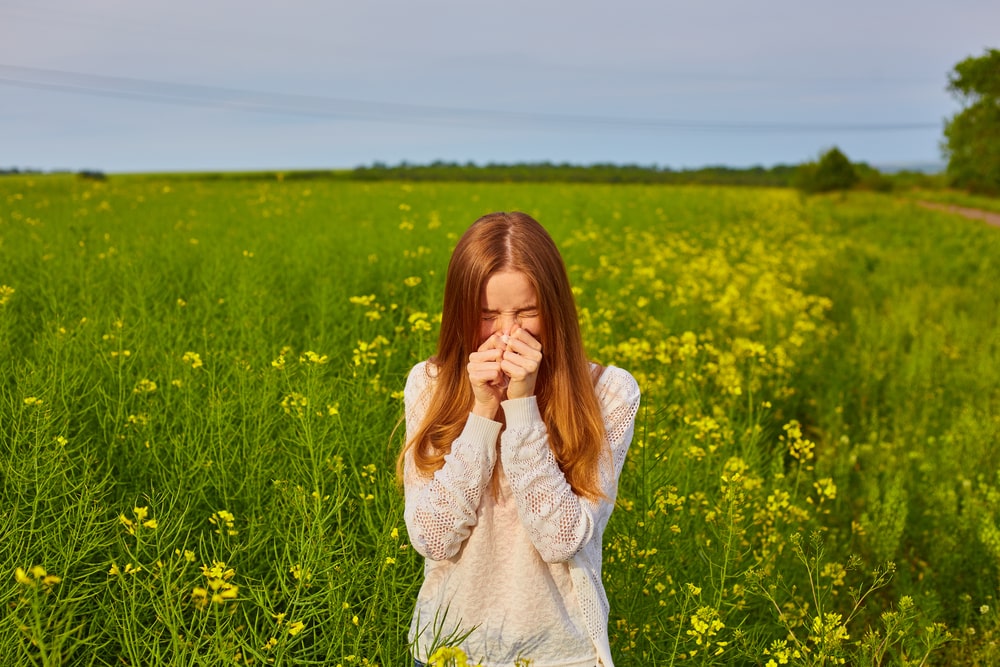Millions of people in the UK suffer from asthma and hay fever allergies which can result in many uncomfortable symptoms and misery for many throughout the summer. With grass pollen one of the major irritants for hay fever sufferers, we attempt to address the question, “Can artificial grass help allergy sufferers?”

Does artificial grass help with hay fever?
Hay fever is incredibly common, and symptoms can include sneezing, headaches, congestion and itchy eyes. Some symptoms, such as problems sleeping and breathing, can be more severe. Whilst hay fever allergies can be triggered by different things, Allergy UK says that 95% of people with hay fever symptoms are affected by grass pollen.
Medication may help through the summer months. Others have suggested that the best way to cope with hay fever is to avoid exposure to grass completely. Allergy UK recognises that “total avoidance by staying indoors is not a realistic option, but reducing contact with allergens is possible.”
In answer to the question “does artificial grass help with hay fever?” it seems that replacing your natural lawn with a high quality artificial grass could potentially be an effective way to reduce hay fever symptoms. False grass does not release pollen into the air, which means you can enjoy the simple pleasures of being outside, whether it’s to eat, drink, socialise, sunbathe or sit and relax without the worry of setting off your symptoms.
Of course, pollen may still be produced by other plants, trees and lawns in surrounding areas, but if your real grass is replaced by fake turf, there is less chance of grass pollen being produced directly in your garden and becoming airborne.
Can fake grass help with asthma?
According to Asthma UK, there are 5.4 million people with asthma in the UK. Whilst there are different triggers for asthma, it is frequently caused by hay fever. Asthma UK state that the three different pollens – tree pollen, grass pollen and weed pollen can all cause hay fever at different times of the year – but that the largest contributor for hay fever is grass pollen.
Hay fever can cause the same symptoms mentioned above in asthma sufferers, but there is also the serious issues of feeling short of breath, having a tight chest, wheezing and the risk of having an asthma attack.
Grass pollen season occurs between April and September, but reaches a peak during May through to July which can be serious for people with asthma.
Replacing your real lawn with synthetic grass will eliminate grass pollen from your immediate area, which should reduce the chances of suffering hay fever symptoms and therefore triggering an asthma attack.
How to manage grass allergies with artificial turf
One of the huge benefits of installing artificial grass is that you don’t need to deal with mowing and strimming your grass. The low level maintenance of astro turf means your allergies won’t be aggravated from the airborne pollen of freshly cut grass and churned up dust.
Additionally, with fake grass, you can throw out your chemical fertilisers and pesticides which could also affect your allergies or asthma.
Does artificial grass help with hay fever? Trust Astro Warehouse for a high quality natural looking replacement.
Grass pollen accounts for a huge percentage of hay fever symptoms, and hay fever can in turn trigger an asthma attack. Whilst false turf cannot eradicate grass pollen completely, it can reduce the amount found directly within your garden, which can ease the possibilities of suffering with hay fever.
A fake lawn also means there’s no need for mowing or cutting grass, which can inflame hay fever symptoms.
At Astro Warehouse, our artificial grass range is premium grade quality and comes by the roll so it can be supplied to you at unbeatable prices. Samples? Order yours here.
We also recommend checking out our installation guides for help fitting fake grass on any type of surface.
Questions? Get in touch with our expert team.
